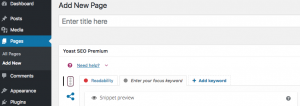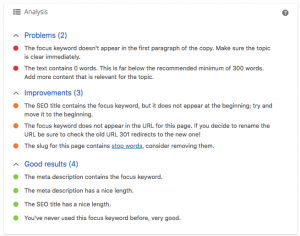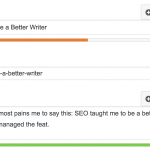Yoast and I are in a fight. It began this morning, when I began using the Yoast SEO plugin in WordPress for a new client’s site. Our conversation went something like this:
Me: Hi Yoast!
Yoast: Hi! You should add a focus keyword for this page.
Me: Great idea. I’ll add the keyword I think will draw the most attention to this page.
Yoast: You used that word in your meta title, but it isn’t the first word in your meta title. That’s not a problem, but it could be improved.
Me: That doesn’t make a lot of sense for this client though. I’m going to ignore that suggestion, and focus on making sure the meta title is clear.
Yoast: Ok, but also your meta title isn’t very long. That’s a problem – you should make it longer, so you can use more variations on the keyword.
Me: But people won’t understand variations on the keyword. And I use those variations in the headers instead, where they are more helpful. I don’t want the title to just be a collection of random words – Google will ding me for that too!
Yoast: Oh, and don’t forget to take out the stop words in your title.
Me: I CAN’T DO ANYTHING RIGHT FOR YOU, YOAST! LEAVE ME ALONE!
That’s when I slammed the door.
Why Yoast’s SEO Works
Every step of the way Yoast was encouraging me to do things that are – strictly speaking – better for SEO. If my title is very short there’s a good chance I threw away an opportunity to make the title more descriptive, easier to understand, and using more keywords. If I have stop words in the title they might be unnecessary and using up space that could go to something more beneficial. If the keyword can be the first term in the meta title, that’s fantastic!

But like with any set of rules, it’s based on assumptions:
- Stop words (the, and, of) are bad. True, typically. But if your product is called “The Hulk” then you may want “The” in your meta title.
- Keyword should be the first word in your title. True, generally. If the page in question is a pricing page, it’s unlikely that you want “pricing” to be your keyword – it’s too generic. Maybe you want to build the keyword value of something slightly more obscure, even though the title of the page will still be “Pricing and Features of The Hulk.”
- You use SEO so people can find you. True, usually. But since Google uses information about your previous searches to improve your future searches, you might use keywords to improve peoples’ ability to find your page after becoming acquainted with your brand and visiting other pages on your site.
Yoast: A Microcopy Example

My fight with Yoast boiled down to a microcopy issue. Yoast was telling me things were wrong or needed to be improved, rather than identifying my goals and encouraging me to improve things that reinforced those goals.
The Yoast analysis categorizes recommendations into “Problems”; “Improvements”; and “Good Results.” But the descriptions are vague. Yoast tells me “The SEO title has a nice length” – but what does that mean? I’ve never heard of an SEO title being too short, but Yoast tells me it can be. (Even a Google search of “Yoast SEO title length” brings up Yoast’s explanation of how long a title can be, but not why it has a “too short” marker.)
While all of Yoast’s recommendations are based in valuable SEO advice, I worry that I will be handing off a site that my client sees as riddled with SEO “problems” and needing “improvements.” Yes, it’s up to me to explain the nuances of our SEO copywriting choices. But it would be nice not to have to explain why a tool we’re using thinks we’re wrong.


